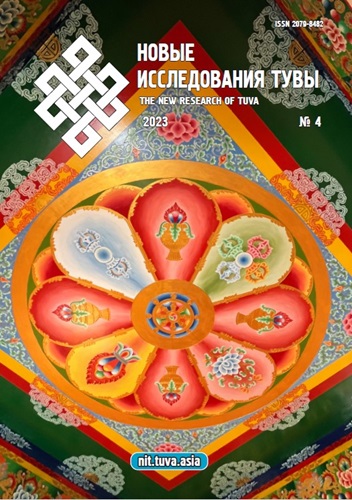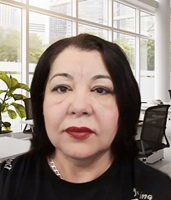Ontic elements as markers of translinguality in E. Mizhit's poems
DOI:
https://doi.org/10.25178/nit.2023.4.12Keywords:
translanguaging; Russian-language artistic production; Tuvan literature; Tuvan poetry; Eduard Bairovich Mizhit; ontopoetics; ontic elementAbstract
The article undertakes an analysis of the poems by the Tuvan poet E. Mizhit (1961–2023), composed in the Russian language. The analysis employs an ontopoetic approach, wherein the object of inquiry is a translanguaging artistic text (crafted by the author in a non-native language), and the focus is on ontic elements facilitating the reconstruction of discrete facets within the author's indigenous linguistic worldview, specifically that of the Tuvan.
Within the artistic corpus of texts, discernible ontic elements encompass “lullaby”, “Earth”, “Sky”, and “yurt”. These elements are construed as corollaries to the linguistic worldview of the Tuvan ethnic milieu, affording the Russian-speaking reader an avenue to acquaint themselves not merely with an alternative perceptual schema but also with a novel attitude grounded in distinct values, conceptions, mandates, and cultural paradigms. Immersion in the culture of the Tuvan ethnic group via poetic text constitutes an experiential emulation of alternative reader dispositions, transcending the “horizon of expectation” as dictated by the monolingual paradigm.
References
Baiyr-ool, M. S. (2013) Iurta v tuvinskoi traditsionnoi kul'ture [The yurt in traditional Tuvan culture]. New Research of Tuva, no. 2, pp. 67–79. (In Russ.).
Bakhtikireeva, U. M. (2021) Rusofon — rusofonnyi — rusofoniia — rusofonnaia literatura — slova global'nye ili lokal'nye? [Russophone — Russophonic — Russophone — Russophonic literature — are the words global or local?]. Sotsial'nye i gumanitarnye nauki na Dal'nem Vostoke, vol. 18, issue 1, pp. 11–17. (In Russ.). DOI: https://doi.org/10.31079/1992-2868-2021-18-1-11-17
Bakhtikireeva, U. M., Valikova, O. A. and Tokareva, N. A. (2021) Na «Agore» segodnia: podkhody k izucheniiu translingval'noi literatury [At “Agora” agenda today: approaches to the study of translingual literature]. Filologicheskie nauki. Nauchnye doklady vysshei shkoly, no. 6, pp. 264–273. (In Russ.). DOI: https://doi.org/10.20339/PhS.6-21.263
Valikova, O. A. (2021) Cōgitō, ergo sum: interv'iu s Eduardom Mizhitom [Cōgitō, ergo sum: Interview with Eduard Mizhit]. Polylinguality and Transcultural Practices, vol. 18, no. 2, pp. 216–223. (In Russ.). DOI: https://doi.org/10.22363/2618-897X-2021-18-2-216-223
Valikova, O. A., Shagimgereeva, B. E. and Kulieva, Sh. A. (2020) Kosmos v logose: translingval'naia poeziia Eduarda Mizhita i Bakhyta Kairbekova [Cosmos in Logos: Translingual Poetry by Eduard Mizhit and Bakhyt Kairbekov]. New Research of Tuva, no. 4, pp. 230–249. (In Russ.). DOI: https://doi.org/10.25178/nit.2020.4.16
Gachev, G. D. (1988) Natsional'nye obrazy mira [National images of the world]. Moscow, Sovetskii pisatel'. 450 p. (In Russ.).
Dampilova, L. S. (2015) Fenomen bilingvizma v sovremennoi poezii narodov Sibiri [The phenomenon of bilingualism in the modern poetry of the peoples of Siberia]. Sibirskii filologicheskii zhurnal, no. 3, pp. 196–202. (In Russ.).
Dianova, L. P. (2021) Funktsii zaimstvovannoi leksiki v tekstakh bilingval'nogo avtora [Functions of Borrowed Vocabulary in Literary Texts by a Bilingual Author]. Polylinguality and Transcultural Practices, vol. 18, no. 2, pp. 194–206. (In Russ.). DOI: https://doi.org/10.22363/2618-897X-2021-18-2-194-206
Dongak, U. A. (2020) Novatorstvo pisatelia-bilingva Eduarda Mizhita (tuvinskaia poeziia) [New Poetic Methods in the Literary Imagination of the Bilingual Writer Eduard Mizhit (Tuvan Poetry)]. Polylinguality and Transcultural Practices, vol. 17, no. 4, pp. 462–474. (In Russ.). DOI: https://doi.org/10.22363/2618-897X-2020-17-4-462-474
Karasev, L. V. (2009) Fleita Gamleta. Ocherk ontologicheskoi poetiki [Hamlet's flute. An essay on ontological poetics]. Moscow, Znak. 208 s. (In Russ.).
Kondrat'eva, N. M. and Sychenko G. B. (1997) Altaitsy: altai-kizhi, telengity, telesy, teleuty, tubalary, chalkantsy, kumandintsy [Altaians: Altai-Kizhi, Telengites, Teles, Teleutes, Tubalars, Chelkans, Kumandins]. In: Muzykal'naia kul'tura Sibiri [Musical culture of Siberia]: in 3 vol. / editor-in-chief B. A. Shindin. Novosibirsk, Sibirskii trakt. Vol. 1. Book 1: Traditsionnaia kul'tura korennykh narodov Sibiri [Traditional culture of the indigenous peoples of Siberia]. 347 p. Pp. 209–283. (In Russ.).
Öövüs. Vozvrashchenie tuvinskoi iurty [Öövüs. Return of the Tuvan yurt] (2022) / comp. by Ch. K. Lamazhaa et al.; ed. by Ch. K. Lamazhaa and N. D. Suvandii. Kyzyl, s. n. 85 p. (In Russ.).
Lotman, Yu. M. (1992) Izbrannye stat'i. T. 1. Stat'i po semiotike i tipologii kul'tury [Selected articles. Vol. 1. Articles on semiotics and typology of culture]. Tallinn, Aleksandra. 479 p. (In Russ.).
Mizhit, L. S. (2022) Filosofskaia lirika Eduarda Mizhita [The Philosophical Lyrics of Eduard Mizhit]. Polylinguality and Transcultural Practices, vol. 19, no. 3, pp. 521–532. (In Russ.). DOI: https://doi.org/10.22363/2618-897X-2022-19-3-521-532
Mizhit, E. B. (2011) Drevniaia tuvinskaia kosmologiia i Tengrianstvo [Ancient Tuvan Cosmology and Tengrianism]. In: Tengrianstvo i epicheskoe nasledie narodov Evrazii: istoki i sovremennost' [Tengrianism and the Epic Heritage of the peoples of Eurasia: Origins and Modernity]. Materials of the III International Scientific and Practical Conference / editor-in-chief L. S. Mizhit. Abakan, Khakass Book Publishing House. 339 p. Pp. 197–207. (In Russ.).
Siniachkin, V. P. (2011) Istoriko-kul'turnyi sloi tiurkizmov v russkom obydennom soznanii [The historical and cultural layer of Turkisms in the Russian everyday consciousness]. Vestnik Rossiiskogo universiteta druzhby narodov. Seriia: Teoriia iazyka. Semiotika. Semantika, no. 4, pp. 85–95. (In Russ.).
Tuvintsy. Rodnye liudi [Tuvans. Native people] (2022) / ed. by Ch. K. Lamazhaa and N. D. Suvandii. St. Peresburg, Nestor-Istoriia. 344 p. (In Russ.).
Tiron, E. L. (2022) Kolybel'nye tuvintsev: po ekspeditsionnym materialam Novosibirskoi konservatorii i Instituta filologii SO RAN [Lullabies of Tuvans: based on the field materials of the Novosibirsk Conservatory and the Institute of Philology of the Siberian Branch of the Russian Academy of Sciences]. Yazyki i fol'klor korennykh narodov Sibiri, no. 1, issue 43, pp. 22–31. (In Russ.). DOI: https://doi.org/10.25205/2312-6337-2022-1-22-31
Shafranskaia, E. F. (2023) Bukvy, pamiat', iazyk: o russkoi transkul'turnoi literature [Letters, Memory, Language: about Russian Transcultural Literature]. Polylinguality and Transcultural Practices, vol. 20, no. 1, pp. 55–65. (In Russ.). DOI: https://doi.org/10.22363/2618-897X-2023-20-1-55-65
Alvorado, L. Y. (2010) Beyond Nation: Caribbean Poetics in Pedro Pietri's “Puerto Rican Obituary” And Kamau Brathwaite's “Islands and Exiles”. Centro Journal, no. 22 (2), pp. 50–73.
De Donno, F. (2021) Translingual Affairs of World Literature Rootlessness and Romance in Jhumpa Lahiri and Yoko Tawada. Journal of World Literature, no. 6 (1), pp. 103–122.
Dorfman, D. (2021) The Weight of National Identity. Nation And Tradition of Translingual Writers. Linguistica y Literatura, no. 80, pp. 69–81.
Heidegger, M. (1996) Being and Time; translated by J. Stambaugh. State University of NY Press. 487 p.
Kellman, S. G. (2019) Translingual Writers: Introductory Notes. Polylinguality and Transcultural Practices, no. 16 (1), pp. 9–12. DOI: https://doi.org/10.22363/2618-897X-2019-16-1-9-12
Pu, R. Q. and Li, H. F. (2019) The Translingual Expressions in Overseas Chinese English Writings. Interdisciplinary Studies of Literature, no. 3 (2), pp. 257–271.
Rahimi, A. (2019) Writing Exile. Journal for Cultural Research, no. 23 (2), pp. 215–219.
Sorvari, M. (2018) Altering language, transforming literature: Translingualism and literary self-translation in Zinaida Linden's fiction. Translation Studies, no. 11 (2), pp. 158–171.
Weininger, M. (2016) Language Politics: The Boundaries of Homeland and Translingual Israeli Literature. Studies in The Novel, no. 48 (4), pp. 477–493.
Published
How to Cite
For citation:
Valikova O. A., Sinyachkin V. P. and Kulieva Sh. A. Onticheskie elementy kak markery translingval’nosti v stikhotvoreniiakh E. Mizhita [Ontic elements as markers of translinguality in E. Mizhit’s poems]. New Research of Tuva, 2023, no. 4, pp. 171‑184. DOI: https://doi.org/10.25178/nit.2023.4.12
Issue
Section

This work is licensed under a Creative Commons Attribution-NonCommercial 4.0 International License.

Author(s) license holder(s) grant rights for their work to the journal (grantee of a license) under the simple non-exclusive open license in accordance with Art. 1286.1 «Open license for a research work, work of literature or fine arts», Civil Code of the Russian Federation.
New Research of Tuva publishes articles under the Creative Commons Attribution-NonCommercial license (CC BY-NC).
Since it is an open license, author(s) reserve the right to upload the article to their institutional repository, submit it to another journal (if it allows republications), or republish it on their own website (in full, or in part).
However, several conditions apply here:
a) The republished version must always contain the name(s) and affiliation(s) of the author(s), the original title and the hyperlink to the original version on the New Research of Tuva website;
b) It must be in open access, free of charge, and no category of readers must be in any way whatsoever advantaged over general readership.
c) should the contribution be submitted elsewhere by its author(s) without substantial modification (30% or more of original text unchanged), the body of the article should contain a disclaimer that the original version was published in New Research of Tuva (with a link to the respective page)
The CC-BY-NC is a non-revocable license which applies worldwide and lasts for the duration of the work’s copyright.











